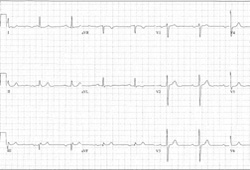Resumo
Definição
História e exame físico
Principais fatores diagnósticos
- presença de fatores de risco
- idade >50-60 anos
- síncope
- frequência cardíaca <40 bpm
- pré-síncope
Outros fatores diagnósticos
- sexo masculino
- fadiga
- dispneia
- dor torácica, palpitações e náuseas ou vômitos
- pressão arterial elevada (menos comumente, baixa)
- ondas A em canhão
- hipoxemia
- história familiar de bloqueio AV
- características da doença de Lyme
Fatores de risco
- alterações degenerativas no sistema de condução relacionadas à idade
- tônus vagal elevado
- agentes bloqueadores do nó AV
- doença arterial coronariana crônica estável
- síndrome coronariana aguda
- cirurgia, intervenção ou ablação cardíaca recente
- insuficiência cardíaca congestiva (ICC)
- hipertensão
- cardiomiopatia
- hipertrofia ventricular esquerda
- distúrbio ácido-básico ou eletrolítico
- distúrbios neuromusculares
- sarcoidose
- miocardite de células gigantes
- tuberculose cardíaca
- doença de Lyme
- endocardite infecciosa
- hipoxemia
- lesão cardíaca contusa
- alguns medicamentos indígenas
Investigações diagnósticas
Primeiras investigações a serem solicitadas
- eletrocardiograma (ECG) de 12 derivações
- troponina sérica
- potássio sérico
- cálcio sérico
- pH sérico
- nível digitálico sérico
Investigações a serem consideradas
- monitoramento ambulatorial por 24 horas ou monitoramento de eventos
- radiografia torácica
- ecocardiografia transtorácica
- teste sorológico para doença de Lyme
- teste da mesa inclinável
- estudo eletrofisiológico
- teste ergométrico cardíaco
- angiografia coronariana
- creatina quinase-MB (CK-MB) sérica
Algoritmo de tratamento
bloqueio atrioventricular (AV) de primeiro grau ou bloqueio AV de segundo grau tipo I
bloqueio atrioventricular (AV) de segundo grau tipo II ou bloqueio AV de terceiro grau
Colaboradores
Autores
Sanjiv Petkar, MD, FRCP
Consultant Cardiologist/Electrophysiologist
Royal Wolverhampton NHS Trust
Heart and Lung Centre
New Cross Hospital
Wolverhampton
UK
Declarações
SP has received speaker's honoraria from Bayer, Bristol-Myers Squibb, MSD, and Pfizer. SP has received hospitality and/or accommodation from Bayer, Medtronic, St Jude, and Boston Scientific for attending conferences or meetings.
Dibbendhu Khanra, MD, DM Cardiology
International Clinical Fellow in Electrophysiology and Devices
Royal Wolverhampton NHS Trust
Heart and Lung Centre
New Cross Hospital
Wolverhampton
UK
Declarações
DK declares that he has no competing interests.
Gaurav Panchal, MBBS, MRCP
Specialist Registrar in Cardiology/Electrophysiology
Royal Wolverhampton NHS Trust
Heart and Lung Centre
New Cross Hospital
Wolverhampton
UK
Declarações
GP declares that he has no competing interests.
Agradecimentos
Dr Petkar, Dr Khanra, and Dr Panchal would like to gratefully acknowledge Dr Pathiraja, Dr Aziz, Dr Susan S. Kim, Dr John F. Beshai, and Dr Stephen L. Archer, previous contributors to this topic. JP, AA, SSK, JFB, and SLA declare that they have no competing interests.
Revisores
Bradley P. Knight, MD
Professor of Medicine
Section of Cardiology
Director
Cardiac Electrophysiology
University of Chicago Medical Center
Chicago
IL
Declarações
BPK declares that he has no competing interests.
Martin C. Burke, DO
Associate Professor of Medicine
Section of Cardiology
Cardiac Electrophysiology
University of Chicago Medical Center
Chicago
IL
Declarações
MCB declares that he has no competing interests.
Nick Gall, MSc, MD, FRCP
Consultant Cardiologist
King’s College Hospital
London
UK
Declarações
NG declares that he has no competing interests.
Thomas A. Dewland, MD
Associate Professor of Medicine
University of California
San Francisco
CA
Declarações
TAD declares that he has no competing interests.
Créditos aos pareceristas
Os tópicos do BMJ Best Practice são constantemente atualizados, seguindo os desenvolvimentos das evidências e das diretrizes. Os pareceristas aqui listados revisaram o conteúdo pelo menos uma vez durante a história do tópico.
Declarações
As afiliações e declarações dos pareceristas referem--se ao momento da revisão.
Referências
Principais artigos
Kusumoto FM, Schoenfeld MH, Barrett C, et al. 2018 ACC/AHA/HRS guideline on the evaluation and management of patients with bradycardia and cardiac conduction delay: a report of the American College of Cardiology/American Heart Association Task Force on Clinical Practice Guidelines and the Heart Rhythm Society. Circulation. 2019 Aug 20;140(8):e382-482.Texto completo Resumo
Tracy CM, Epstein AE, Darbar D, et al. 2012 ACCF/AHA/HRS focused update of the 2008 guidelines for device-based therapy of cardiac rhythm abnormalities: a report of the American College of Cardiology Foundation/American Heart Association task force on practice guidelines. Heart Rhythm. 2012 Oct;9(10):1737-53.Texto completo Resumo
Glikson M, Nielsen JC, Kronborg MB, et al; ESC National Cardiac Societies; ESC Scientific Document Group. 2021 ESC Guidelines on cardiac pacing and cardiac resynchronization therapy. Eur Heart J. 2021 Sep 14;42(35):3427-520.Texto completo Resumo
Artigos de referência
Uma lista completa das fontes referenciadas neste tópico está disponível para os usuários com acesso total ao BMJ Best Practice.

Diagnósticos diferenciais
- Ritmo juncional
- Taquicardia supraventricular (TSV)
- Fibrilação atrial ou taquicardia atrial multifocal (TAM)
Mais Diagnósticos diferenciaisDiretrizes
- 2025 appropriate use criteria for implantable cardioverter-defibrillators, and cardiac resynchronization therapy, and pacing
- 2022 AHA/ACC/HFSA guideline for the management of heart failure
Mais DiretrizesFolhetos informativos para os pacientes
Fibrilação atrial: quais são as opções de tratamento?
Fibrilação atrial: o que é?
Mais Folhetos informativos para os pacientesConectar-se ou assinar para acessar todo o BMJ Best Practice
O uso deste conteúdo está sujeito ao nosso aviso legal